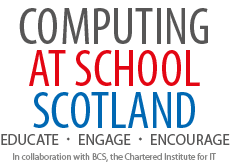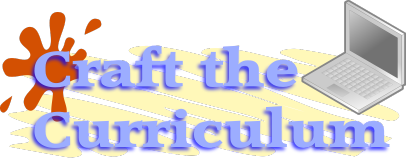The Opportunity
“Craft the Curriculum” is a series of two Friday/Saturday sessions jointly organised by the PLAN C project created by CAS Scotland and the BCS Academy of Computing in partnership with Education Scotland. It brings together subject experts from industry and tertiary education with experienced secondary school Computing teachers in order to create a series of new learning activities for the new Higher qualification in Computing Science.
Resources and activities created at the sessions will be published nationally, with suitable acknowledgements, by Education Scotland. They will also be highlighted and discussed at PLAN C local hub group meetings across the country that over two thirds of all Computing teachers regularly participate in.
Travelling expenses to take part will be provided for both “Higher Computing Science-Craft the Curriculum” sessions as well as all meals. Overnight accommodation on the Friday evening of both sessions can also be provided if required.
Who we’d Like to Join Us
We’re particular keen for academics, college lecturers and IT professionals with subject knowledge and expertise in the following areas:-
- Programming paradigms such as Imperative, Declarative, Object Orientated and Domain Specific and comparative differences between them.
- Static and dynamic testing methods- dry runs, trace tables and break points and how they can be used in debugging in Python, Livecode, Basic and Java programming environments.
- User interface design using wireframing.
- Software development methodologies including agile and rapid application development.
- Software emulation and virtual machines.
- Cyber security issues such as censorship and freedom of speech and privacy and encryption as well as how techniques such as encryption, server-side validation of form data, biometrics and digital certificates and signatures work.
- Design and implementation of simple web applications that illustrate how markup, client and server side scripting, stylesheets and content stored in a database can be combined.
- Design and configuration of online systems and services focussing on their processing, storage, networking and security requirements.
- Design and implementation relational data models and manipulating them using SQL.
and for teachers with ideas for new activities who have created learning materials particularly if some of them have been:-
- Short review activities for consolidation of prior learning.
- Small programs, code snippets or information systems with comprehension orientated exercises that encourage pupils to explore their behaviour, function or structure.
- Worked examples via screencast or written tutorial that model a particular process in Computing. For example, given a program specification what should the test data for it be?
- Case studies based around news stories or a technology that pupils are familiar with.
- Guided inquiry learning involving focused research and synthesis of information.
- Cooperative learning activities- this could include pair programming, cooperative code review or other practical work that relies on coordinated and interdependent activity.
- Animations that help explain how particular pieces of software or hardware work.
- Unplugged activities that involve pupils engaging with a particular Computing concept through physical simulation of the process away from the computer.
Benefits in Taking Part
With your help, pupils will have a better appreciation of the power of Computing Science as a way of thinking about and understanding the digital world they are growing up in. A richer learning experience and better foundation will also increase the likelihood that some will consider and be better prepared for a career in the ICT sector through apprenticeships or further study at college or university level when they leave school.
Overall, this is a fantastic opportunity to contribute some time and expertise that directly impacts on 5th and 6th year pupils experience of Computing in classrooms across the country. If you care about the quality of Computing education available to future generations and think you can help then please register to take part.
Peter Donaldson
National Project Officer

event organised and supported by



